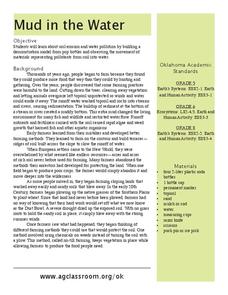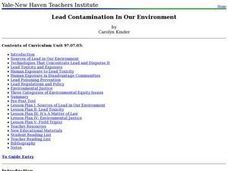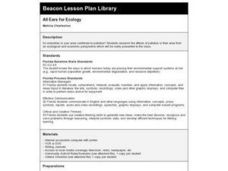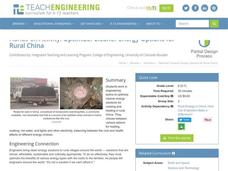Curated OER
Evaporation and Condensation
Students explore how temperature affects the processes of evaporation and condensation.
Curated OER
Mud in the Water
Sixth graders investigate erosion. In this erosion activity, 6th graders explore how farming changes the environment. Students construct an erosion model and research ways to protect the soil from excess mud generated by farming.
Curated OER
Lead Contamination In Our Environment
Students identify the sources of lead in their local community and how to prevent further contamination. As a class, they watch a video about the effects of lead on the body and use the internet to discover any new technology that can...
Curated OER
All Ears for Ecology
Fourth graders research to see the effects that air pollution has on where they live. They explore improper dumping of waste run-off, air pollution, and water pollution.
Curated OER
Language Arts: How Can Research Shape Ideas?
Students are able to characterize arsenic and determine its potential health threats in writing. They are able to compare and contrast arsenic to other water pollutants using Venn diagrams. Students are able to demonstrate essay skills...
Curated OER
Environmental Responsibility
Young scholars discuss the importance of recycling and preventing pollution. In groups, they complete mini-studies on various environmental issues and evaluate different consumer products. They use global warming data to determine the...
Curated OER
Organic and Inorganic Recycling
Students examine their role in polluting the environment and discuss the importance of recycling. In groups, they place earthworms into compost piles to observe why they are considered natural recyclers. They also practice sorting a...
Curated OER
Rivers for the Common Good
Students explore what effects improper waste disposal and water pollution have on the water cycle. They explore how philanthropic acts can help protect the water cycle and keep our water and planet clean.
Teach Engineering
Chromatography Lab
Groups use alcohol and chromatography paper to separate the color components of black ink. The purpose of the activity is to allow the class to become aware that mixtures exist in hidden places.
Calvin Crest Outdoor School
Survival
Equip young campers with important survival knowledge with a set of engaging lessons. Teammates work together to complete three outdoor activities, which include building a shelter, starting a campfire, and finding directions in the...
Teach Engineering
Optimize! Cleaner Energy Options for Rural China
What are the trade-offs when looking to get the most benefit from an energy source? Small groups compare the cost-to-emission levels of several energy sources by looking at the information graphically. The groups utilize this information...
American Museum of Natural History
Ask a Scientist About Our Environment
Scientists respond to 26 question posed by learners. These experts answer in easy to understand language, include photos to illustrate the issue, offer suggestions for how young people can make a difference, and supply links to resources...
American Museum of Natural History
Ask a Scientist About Our Environment
Let's ask an expert! Scientists at the American Museum of Natural History field questions about the environment in an interactive resource. Question topics range from global warming and conservation to endangered species and habitats.
Teach Engineering
The Great Pacific Garbage Patch
The Great Pacific Garbage Patch is one of several garbage patches around the world where garbage accumulates naturally. As part of a GIS unit that combines oceanography, environmental science, and life science, class members investigate...
Illinois Department of Natural Resources
Section Four: How Can We Protect Biodiversity?
Look into the future with a lesson plan on biodiversity and natural habitats. Learners read articles about different perspectives when it comes to planning future development, and decide which angle is the highest priority in a group...
NOAA
Why is Hawaii's Ocean Important?
Studying the oceans? Focus on Hawaii's ocean with a resource packed with activity-based worksheets. Everything from products that come from the ocean to the abundance of plants and animals that call the ocean their home, Hawaii's ocean...
NOAA
Off Base
How does carbon dioxide affect the world's oceans? The final installment in a series of six lessons has pupils research ocean acidification, then conduct an experiment to witness the delicate balance that exists in our seas. Materials...
NOAA
Build Your Own Ocean Ecosystem
Hold the sea in the palm of your hand! Amateur oceanographers work together to create models of an ocean ecosystem in the sixth and final installment in a series. Raise awareness of global ocean health issues through guided research,...
Curated OER
Our Country's Environment
In these environment worksheets, students complete several multiple choice questions that teach them about the Earth's landforms and water.
Curated OER
Oily Oceans
Students, after reading Jack, the Seal and the Sea, by Gerald Aschenbrenner, get a hands-on knowledge of the effects of oil on water, and those things that come in contact with it.
Curated OER
Storm Drain Dumping
Students develop an awareness of what happens to water contaminated through neighborhood runoffs. Students perform an experiment that shows what happens to runoff when it's diverted to different places.
Curated OER
Pea Soup Ponds
Young scholars perform an experiment where they learn how water can be polluted by algal bloom. They grow algae with different concentrations of fertilizers or nutrients and analyze their results.
Curated OER
Industrialization of the American Landscape
Students summarize the three sectors of industry and how these sectors applied to the Industrial Revolution. Students apply their skills in research and note-taking, as well as vocabulary building through web organizers. Students...
Curated OER
Acid Rain
Students perform experiments to determine how different acids cause acid rain. They measure the pH of the water to calculate the water's acidity. They discover how acid rain dissolves rock materials.
Other popular searches
- Water Pollution Worksheets
- Water Pollution Experiments
- Air and Water Pollution
- Sources of Water Pollution
- Air Water Pollution
- Water Pollution Lesson Plans
- Water Pollution Activity
- Bacterial Water Pollution
- Water Pollution Works
- Water Pollution Lesson
- Water Pollution Oil Spills
- Types of Water Contamination

























